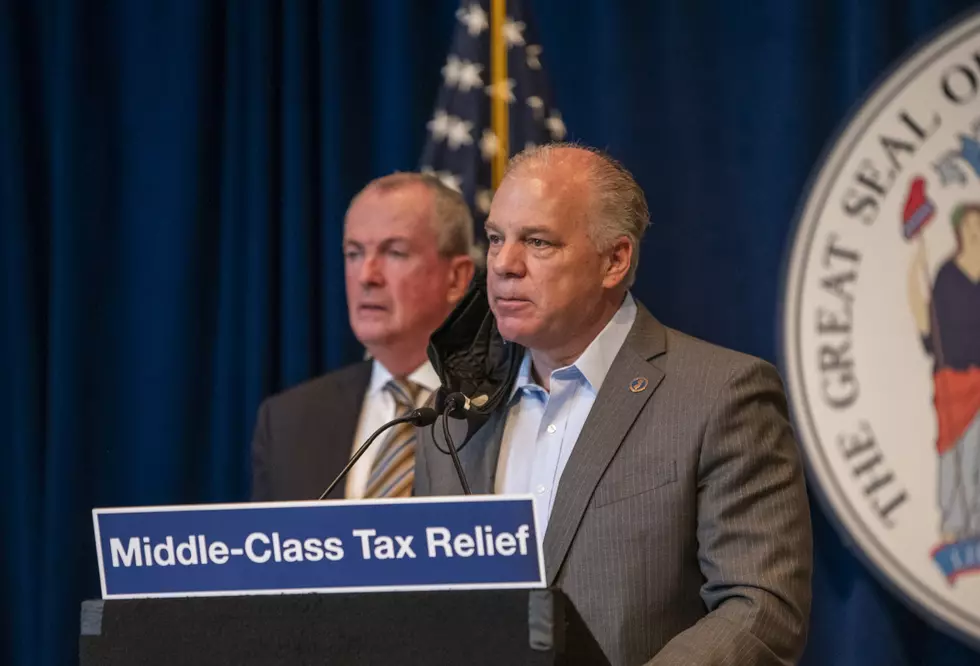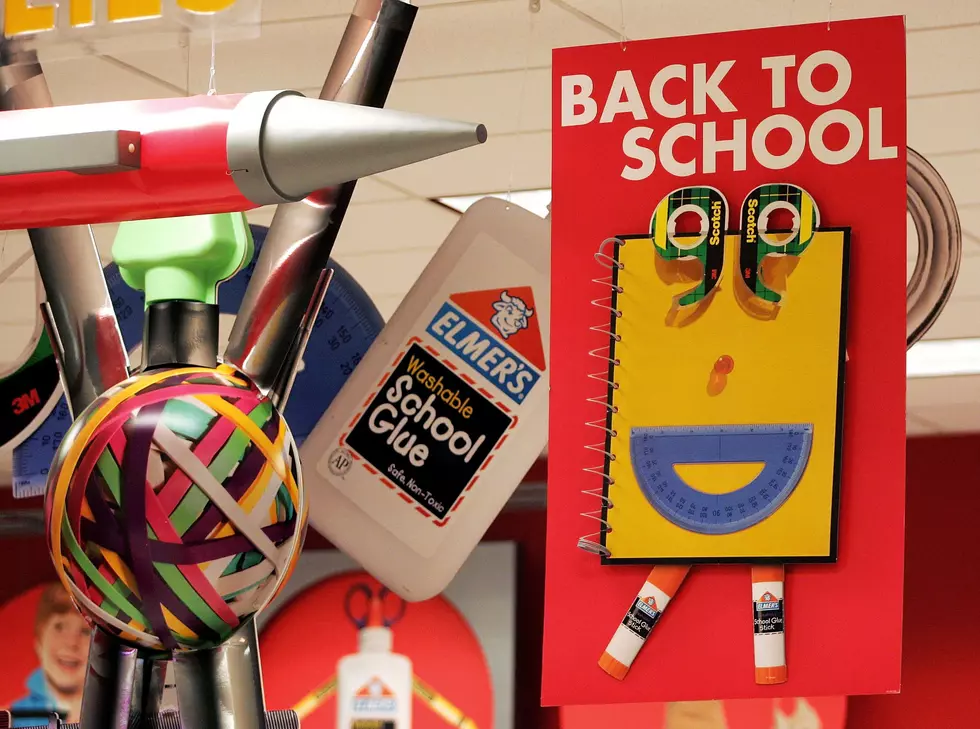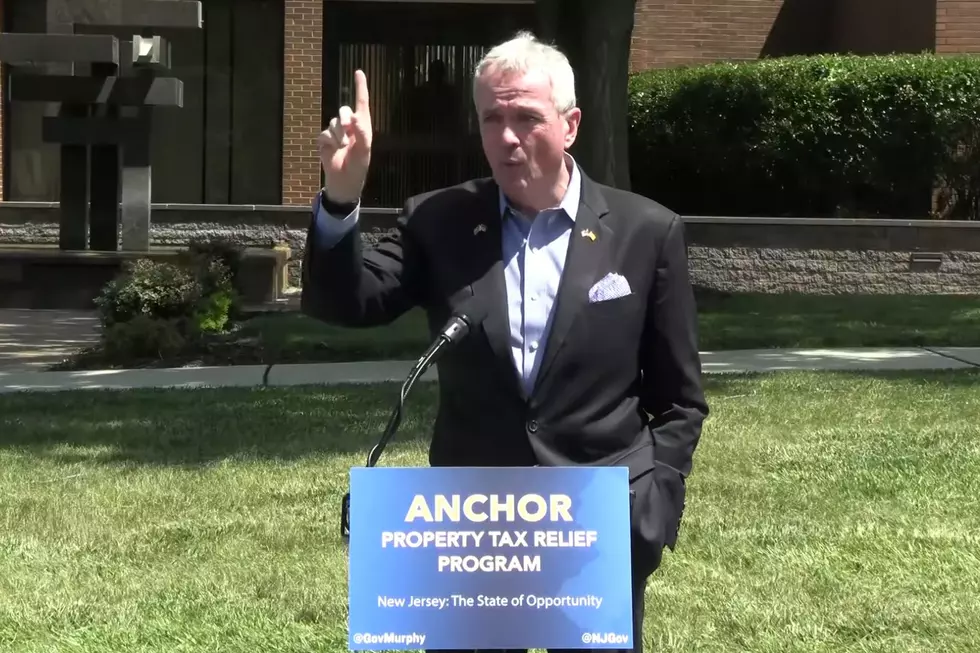
Pandemic clears way for return of millionaires tax in NJ
In the end, it took a worldwide pandemic – plus a plan for $500 checks to middle-class families in an election year – to get a millionaires tax back on the books in New Jersey.
Gov. Phil Murphy pledged as a candidate to restore the tax that had sunset at the end of 2009, but he was thwarted primarily by Senate President Steve Sweeney, D-Gloucester, who said federal tax changes approved in 2017 limiting state and local tax deductions had made it a bad idea.

Then on Thursday, Sweeney joined Murphy to announce a millionaires tax would be approved in the budget due to be adopted in two weeks.
“We resisted, and I vocally resisted, the millionaires tax for years. And it wasn’t a political thing about governor or me. It was I had a problem with it at the time,” he said. “But the pandemic hit, and things have changed. And we have to face the reality that a lot of families are hurting here.”
Murphy said the rebate checks would help families hurt by the economic shutdowns he ordered in response to the novel coronavirus.
“The principle that we coalesced around was simple,” Murphy said. “As we look to the other side of this pandemic, we will need to fuel an economic recovery.”
“Many of our middle class and working families were laid low when the steps we have had to take – painful steps, I might add – to protect families and save lives from the pandemic meant that they couldn’t go to work. Now we’re going to help by giving them back some of what they lost,” he said.
The tax rate is already 10.75% on income over $5 million. That marginal tax rate will instead begin applying at $1 million in income. The rate applies to all income above that amount, not a filer’s whole income.
Sweeney changed his mind when Assembly Speaker Craig Coughlin, D-Middlesex, suggested a new income-tax rebate program for low- and middle-income families.
“Until he came to me, I wasn’t really there,” Sweeney said. “But helping middle-class families makes all the sense in the world to me at this time.”
Coughlin called the deal “really a historic win for the middle class and for families in New Jersey.”
“The agreement that we reached will provide much-needed tax relief for so many who can truly use a break. It will make a tangible difference,” Coughlin said.
“Many of those families are struggling right now to make ends meet, to afford the everyday necessities that have become more challenging as a result of the coronavirus,” he said. “And helping the middle-class families for all of us is a priority. It’s something that we must continue to do, especially as we deal with the economic crisis that the pandemic has caused.”
Rebate checks will be automatically distributed in the summer of 2021 to income-tax filers who have dependent children that meet the eligibility threshold of $150,000 for joint filers and $75,000 for an individual filer.
Assembly Democrats say nearly 700,000 middle class families will receive $500 rebate checks. Murphy said approximately 800,000 families will receive rebates, which suggests that 100,000 will get rebates smaller than $500.
The state Treasury Department said the rebate is non-refundable, meaning it will not exceed a taxpayer’s tax liability. People who pay less than $500 in income taxes would get less than $500.
The rebates are expected to be paid out early in fiscal 2022 – which is how a millionaires tax that’s retroactive to Jan. 1, 2020 could help balance the fiscal 2021 budget, even though the cost of the rebate would take up much of the estimated $390 million in tax revenues that result from the tax hike.
It’s not clear if the rebate will survive beyond 2021.
“I think we all would want to see this as an annual event,” Murphy said. “We have to revisit this every year, but this is – right, folks? – this is something that we feel passionate about, putting money directly into the middle class is at the top of our respective and collective agendas.”
Business groups and Republican lawmakers criticized the agreement.
“Sooner or later this administration needs to realize that the business community is not a bottomless ATM machine,” said Tom Bracken, president and chief executive officer of the New Jersey Chamber of Commerce. “Our businesses are struggling to keep their doors open and their employees on payroll. They need help too."
“New Jersey deserves much better from our governor and legislative leadership,” said New Jersey Business and Industry Association president and chief executive officer Michele Siekerka.
“It’s a gimmick that proves what we have said all along – higher taxes aren’t necessary to balance the budget,” said Assemblywoman Serena DiMaso, R-Monmouth. “Murphy said he needed to raise taxes because revenues were dropping, but now it’s to fund special rebates next year when he is running for re-election.”
“It’s like walking into a store where all of the prices have just been raised by 20% and being told the 10% off coupon they’re handing you will save you money. People are smarter than that,” said Sen. Kip Bateman, R-Somerset.
“Gov. Murphy’s plan to raise taxes is a gift for the Florida economy and a nightmare for New Jersey,” said Assemblyman Jon Bramnick, R-Union. “Passing another ill-conceived tax will make outmigration worse and shift the tax burden onto the middle-class when others leave.”
Murphy, in a statement sent through the New Jersey Democratic State Committee, rather than the Governor’s Office, said Republicans were trotting out discredited talking points.
“Trenton Republicans are showing where they stand, which is with the richest 1% of our population, those who have prospered while the wealth gap between them and the middle-class and working families has continued to increase every year,” Murphy said. “Frankly, it’s hardly a surprise.”
Sweeney said he, Murphy and Coughlin are going to focus on government affordability reforms, too.
“There’s a whole bunch of other ideas out there that – yesterday, when we spoke yesterday, the speaker and the governor, we all committed to working together to find more reforms to make things better,” he said. “We didn’t walk away. There’s two sides of the envelope, and we’re going to work on both.”
Murphy concurred.
“Yeah, I would echo that,” Murphy said. “We had a specific discussion yesterday about everything from asset sales to whatever else we could do to make government run more efficiently and effectively.”

More From Townsquare Media News:
7 Ways To Manage Anxiety/Depression During COVID-19 Pandemic
More From Beach Radio










